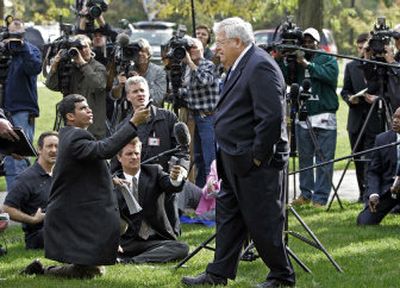Hastert stands by aides’ actions

WASHINGTON – House Speaker Dennis Hastert, whose office has been under fire for failing to deal more aggressively with former Rep. Mark Foley’s interest in congressional pages, said Tuesday he would fire anyone on his staff who covered up information about the former lawmaker’s conduct.
But the embattled Hastert continued to stand by his aides, as investigations by the FBI and House ethics committee moved forward.
And the Illinois Republican refused to discuss any suggestion that he should resign as speaker, as new polls showed the GOP’s prospects for holding on to control of the House in November have diminished.
“I think … they’ve handled (the Foley matter) as well as they should,” Hastert said of his aides in Aurora, Ill., where he delivered a speech on the economy.
Still, he said that “if anybody’s found to have hidden information or covered up information, they really should be gone.”
He also noted that many of Foley’s contacts with male pages appear to have occurred after the teenagers left Washington, suggesting that made it more difficult for Capitol Hill officials to know of the Florida Republican’s misconduct.
Foley resigned his House seat in late September after it was revealed that some of the messages he sent pages over the years were sexually explicit. The GOP House leadership cautioned Foley late last year about what have been characterized as “overly friendly” messages to pages, but Hastert has said neither he nor his aides knew then about the sexually explicit communications.
Republican strategists, concerned about the scandal’s political fallout, are urging GOP officials to work hard to shift attention from the embarrassing case to other issues, such as economic growth and national security.
But Hastert and other Republicans continue to be dogged by questions about why they didn’t investigate Foley more vigorously a year ago.
On Tuesday, Rep. Jim Kolbe, an Arizona Republican who is retiring this year, sought to downplay suggestions that he should have done more when a page told him several years ago that he had received e-mails from Foley that made him feel uncomfortable.
“I was not shown the content of the messages and was not told they were sexually explicit,” Kolbe said in a statement. “It was my recommendation that this complaint be passed along to Rep. Foley’s office and the clerk who supervised the page program. This was done promptly.”
A Kolbe spokeswoman could not say precisely when the former page contacted Kolbe, saying it was between 2000 and 2002.
The scandal continues to be a hot issue in a number of campaigns nationwide.
In New York, Jack Davis, the Democratic challenger to Rep. Tom Reynolds, chairman of the House GOP campaign committee, aired a new television advertisement attacking the incumbent for failing to move aggressively to stop Foley’s contact with pages.
“Tom Reynolds knew that Congressman Mark Foley was a predator,” says the ad. “What did he do? Tom Reynolds urged Foley to seek re-election.”
Reynolds, whose committee job entails overseeing the GOP effort to retain its House majority, has said he learned last spring of Foley’s “overly friendly” contacts with pages and informed Hastert about them. But, like Hastert, Reynolds has said he had no knowledge of the sexually explicit messages.